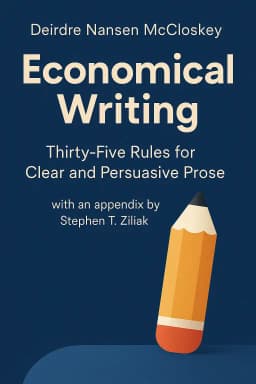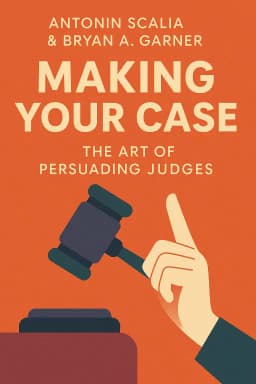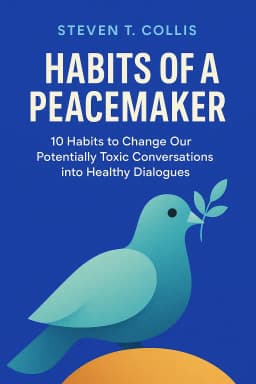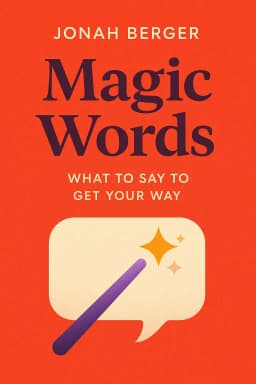
The Guru's Paradox
How Highly Effective People Speak: How High Performers Use Psychology to Influence With Ease
Golden Hook & Introduction
SECTION
Michelle: Alright Mark, I'm going to give you a book title: How Highly Effective People Speak. What's the first, most brutally honest thought that comes to mind? Mark: My first thought is that it was definitely not written for me, because I'm pretty sure my most 'effective' speaking happens when I'm trying to convince my dog to get off the couch. And even then, it's a 50/50 shot. Michelle: That's fair! But the author, Peter Andrei, might argue he has the psychological trick to make even that negotiation successful. And his story is what really hooked me. This isn't just some academic in an ivory tower. Mark: Oh? Don't leave me hanging. Michelle: He actually overcame a childhood speech impediment. And he didn't just overcome it—he went on to become a state debate champion in Massachusetts and a public speaking coach. Mark: Whoa, okay. That's a serious comeback story. That’s not just theory; he's lived the struggle. That changes things. It’s not just another guru promising a silver bullet. Michelle: Exactly. And that personal journey is at the heart of this book, How Highly Effective People Speak, and its very big, very bold promise about unlocking the secrets to influence.
The 'Hidden Psychology' Premise
SECTION
Michelle: The core idea Andrei presents is that there's a science to what he does. He claims his book is built on decades of research and reveals "hidden, little-known secrets of psychology." He’s very specific, claiming to have identified 194 communication habits of highly effective people, all backed by 57 proven scientific studies. Mark: Okay, "hidden secrets of psychology." My skeptical antenna is twitching a little. Is this genuinely groundbreaking, or is it a brilliant way to rebrand good social skills? You know, framing common sense as 'secret knowledge' to sell books. Michelle: That's the million-dollar question, isn't it? He argues that most of us are, in his words, "swimming upstream" when we communicate. We're fighting against the natural currents of human psychology. His whole premise is that if we ignore these psychological principles, we'll never truly "change minds, win friends, or influence people." Mark: I get the concept. It’s appealing. Instead of just guessing what works, you follow a scientifically-proven blueprint. But can you give me a concrete example? What does one of these 'hidden' habits actually look like in practice? Michelle: A great example he touches on is leveraging cognitive biases. These are the mental shortcuts our brains use to make decisions quickly. For instance, the 'contrast effect'. The idea is that our perception of something is heavily influenced by what we saw or heard immediately before it. Mark: Right, like how a real estate agent shows you a ridiculously overpriced, rundown house first, so the next, slightly less terrible house seems like a fantastic deal. Michelle: Precisely. Andrei suggests that effective speakers use this instinctively. Before they present their main idea, they might present a less appealing alternative or a more complex, confusing scenario. Then, when they introduce their own solution, it seems incredibly simple, elegant, and desirable by comparison. It’s not about the idea itself; it’s about how it’s framed against what came before. Mark: Huh. That’s clever. It’s a subtle shift from just stating your case to architecting the entire experience for the listener. So you’re not just delivering information; you’re guiding their perception of it. Michelle: Exactly. And he connects this back to his own story. He talks about his early life, how he constantly felt his ideas were being rejected. He was frustrated and confused. It wasn't until he stopped focusing on his own arguments and started studying how successful people communicated that he had his breakthrough. He realized they speak in a way that aligns with how the human mind is already wired to interpret information. Mark: That’s a powerful personal narrative. It reframes his work from a set of tips to a personal discovery. He’s not just a coach; he’s the first student of his own method. It makes the promise feel more authentic. Michelle: It absolutely does. He’s essentially saying, "I was lost, I found a map based on science, and now I'm giving that map to you." It’s a compelling pitch, especially for anyone who has ever felt unheard or misunderstood in a meeting or a presentation. Mark: I can see the appeal. It turns communication from a mysterious art into a learnable science. But it also sounds like it could be a bit… manipulative? Are we using psychology to connect with people or to just get what we want? Michelle: The book does touch on the ethical dimension. The idea is that these tools are neutral, like a hammer. You can use them to build a house or to break a window. The focus is on using them to promote truth and positive outcomes. But you're right to point out that line can get blurry very, very quickly. It’s a tool of influence, and influence always carries that dual potential.
The Enigmatic Author & The Polarizing Reception
SECTION
Mark: Okay, so the ideas sound powerful, if a bit hyped. But what about the author himself? You'd think a guy who's cracked the code on influence and public speaking would be a major public figure. A modern-day Dale Carnegie, all over social media, TED talks, the whole circuit. Michelle: And this is where the story gets really fascinating. For a public speaking expert, Peter Andrei is remarkably private. He has a very limited online presence. He’s not on Twitter, his LinkedIn is sparse, and he’s not out there building a huge personal brand in the way you’d expect. Mark: Wait, hold on. A communication guru who doesn't communicate on the world's biggest platforms? That's a massive contradiction. It’s like a world-class chef who refuses to eat in restaurants. Michelle: It is. And it’s a stark contrast to his background. His Amazon profile says he's won over 27 awards for competitive public speaking. The National Speech and Debate Association even gave him a special distinction for accumulating over 500 speaker points. This is someone who knows how to command a stage. Mark: So he’s a champion performer who chooses to stay behind the curtain. That’s a puzzle. What do you make of that? Michelle: I think it ties directly into the reception of the book. The book has been a huge commercial success in its niche. It hit #1 in Amazon's Public Speaking category and was even named a top reference book by one review site. A lot of readers, especially entrepreneurs, have left glowing reviews, calling it a "huge game-changer" for their business. They love the practical, science-backed tips. Mark: That makes sense. It delivers on its promise for a certain audience. But I'm sensing a 'but' coming. Michelle: A big one. There's a significant group of readers who are highly critical. The book gets called out for being "verbose and overzealous." A very common complaint is that the "author repeats himself over and over." And the most ironic criticism of all, for a book on effective communication… Mark: Let me guess. Grammatical errors and typos? Michelle: You got it. Multiple reviews mention editing issues. And this creates the exact paradox you pointed out. How can a master of communication produce a written work that, for some, feels poorly communicated? Mark: That's incredible. It's like the book itself is a case study in its own principles. The content might be brilliant, but if the delivery—the formatting, the editing, the repetition—is flawed, it undermines the message's credibility for a portion of the audience. Michelle: Precisely. And this might connect back to his being a self-published author. He has over 20 books, most in his 'Speak for Success' series. On one hand, that shows incredible confidence and a direct-to-audience drive. On the other, it might mean he lacks the rigorous editing and feedback process of a traditional publisher, which could explain the critiques. Mark: It almost feels like his strength as a competitive speaker—the repetition of key points for emphasis, the forceful delivery—might translate into a weakness in his writing style. What works on a debate stage doesn't always work on the page. Michelle: I think that's a brilliant insight. The medium matters. And the messenger matters. The whole phenomenon of this book is a lesson in influence. The powerful backstory, the promise of scientific secrets, the bestseller status—all of that creates a 'halo effect' that makes many readers love it. But the perceived flaws in the execution break that spell for others. Mark: So the book's reception is just as polarizing as the author is private. It’s not a simple story of a great book or a bad book. It’s a much more complex picture about how we perceive value and expertise.
Synthesis & Takeaways
SECTION
Michelle: Exactly. When you step back, the story of How Highly Effective People Speak is about more than just communication tips. It’s a mirror reflecting our deep, collective desire for a formula—a scientific-looking shortcut to being heard, respected, and influential. Mark: We want to believe there's a cheat code for human connection. And a book that promises 194 habits backed by 57 studies feels like the ultimate cheat code. Michelle: It does. And the success of this book, despite the author's reclusiveness and the book's noted flaws, demonstrates just how powerful that promise is. In a way, the real "hidden psychology" at play might not be the 194 habits inside the book, but the psychology of the book's marketing and positioning itself. It’s perfectly crafted to appeal to our insecurities and our hope for self-improvement. Mark: That's a fantastic point. It makes you wonder, what's ultimately more influential: the specific techniques detailed in the book, or the compelling story of the author who overcame a speech impediment to share his secrets with the world? Michelle: That’s the question to sit with. His personal story is perhaps the most powerful communication tool of all. It’s a perfect narrative. And it makes you think about your own communication. What are the stories we tell ourselves and others? Mark: And what's one 'habit' you rely on, for better or worse? I know mine is probably using humor to deflect from serious topics. It’s effective, but maybe not always for the right reasons. Michelle: A great self-reflection. We'd love to hear what our listeners think. What’s one communication habit you’ve noticed in yourself or others that has a surprisingly powerful effect? Find us online and share your take. We’re always curious to hear your stories. Mark: It’s a conversation worth having. This was a fascinating look at a book that’s so much more than what’s on the page. Michelle: This is Aibrary, signing off.









